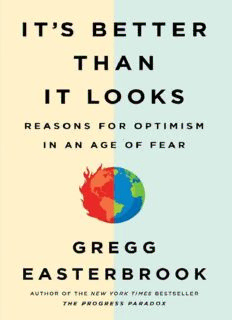
It’s Better Than It Looks: Reasons for Optimism in an Age of Fear PDF
Preview It’s Better Than It Looks: Reasons for Optimism in an Age of Fear
Copyright Copyright © 2018 by Gregg Easterbrook Hachette Book Group supports the right to free expression and the value of copyright. The purpose of copyright is to encourage writers and artists to produce the creative works that enrich our culture. The scanning, uploading, and distribution of this book without permission is a theft of the author’s intellectual property. If you would like permission to use material from the book (other than for review purposes), please contact [email protected]. Thank you for your support of the author’s rights. PublicAffairs Hachette Book Group 1290 Avenue of the Americas, New York, NY 10104 www.publicaffairsbooks.com @Public_Affairs First Edition: February 2018 Published by PublicAffairs, an imprint of Perseus Books, LLC, a subsidiary of Hachette Book Group, Inc. The PublicAffairs name and logo is a trademark of the Hachette Book Group. The Hachette Speakers Bureau provides a wide range of authors for speaking events. To find out more, go to www.hachettespeakersbureau.com or call (866) 376-6591. The publisher is not responsible for websites (or their content) that are not owned by the publisher. Library of Congress Cataloging-in-Publication Data Names: Easterbrook, Gregg, author. Title: It’s better than it looks : the case for optimism in an age of fear / Gregg Easterbrook. Description: First edition. | New York : PublicAffairs, [2018] | Includes bibliographical references and index.Identifiers: LCCN 2017048518| ISBN 9781610397414 (hardcover) | ISBN 9781610397421 (ebook) Subjects: LCSH: Progress. | Quality of life. | Civilization, Modern—21st century. | Economic history. | Social history. Classification: LCC HM891 .E268 2018 | DDC 306.09—dc23 LC record available at https://lccn.loc.gov/2017048518 ISBNs: 978-1-61039741-4 (hardcover), 978-1-61039742-1 (ebook) E3- 20180206-JV-PC Contents Cover Title Page Copyright Dedication Epigraph Preface: Optimism Goes Out of Style PART I Why the World Refuses to End One: Why Don’t We Starve? Two: Why, Despite All Our Bad Habits, Do We Keep Living Longer? Three: Will Nature Collapse? Four: Will the Economy Collapse? Five: Why Is Violence in Decline? Six: Why Does Technology Become Safer Instead of More Dangerous? Seven: Why Don’t the Dictators Win? PART II The Arrow of History Eight: How Declinism Became Chic Nine: The “Impossible” Challenge of Climate Change Ten: The “Impossible” Challenge of Inequality Eleven: We’ll Never Run Out of Challenges… Twelve: … And It Will Never Be Too Late Acknowledgments About the Author Notes Index For William Whitworth from the Arkansas Gazette to The New Yorker to editor-in-chief of The Atlantic: the consummate editor The great fact to remember is that the trend of civilization is forever upward. —Franklin Delano Roosevelt, shortly before his 1945 death Preface: Optimism Goes Out of Style ON THE NOVEMBER 2016 DAY Donald Trump was elected president of the United States, unemployment was 4.6 percent, a number that would have caused economists of the 1970s to fall to their knees and kiss the ground. In real-dollar terms, gasoline prices were the same as when teenagers rushed to record stores to buy the latest 45-rpm monaural singles. Natural resources and foodstuffs were plentiful. Middle-class wages and household income were rising. The economy had expanded for eighty-nine consecutive months. Private-sector jobs had grown for eighty consecutive months, nearly doubling the previous record of forty-eight months; a net of eight million jobs had been added in less than a decade. US industrial output was at an all-time record. Inflation had been low for a decade, while mortgage rates and other borrowing costs were at historic lows. Crime, especially homicide, was in long-term decline. All forms of pollution except greenhouse gases were in long-term decline; all forms of discrimination were in long-term decline; most disease rates were in long-term decline. Education levels and longevity were the highest ever. Two-thirds of the globe’s reserve currency was held in the USD, which meant the rest of the world judged America’s prospects to be excellent. The United States military not only was the strongest—it was stronger than all other militaries of the world combined. Objectively, America was in the best condition it had ever been in. Yet Trump convinced voters that “our country is going to hell.” Despite the industrial output record, Trump convinced voters that “we don’t make things anymore.” Despite the glittering numbers, Trump convinced voters that the economy “is always bad, down, down, down.” Despite the urban comebacks of Boston, Chicago, Cleveland, Denver, Philadelphia, Pittsburgh, and Washington, DC, Trump convinced voters that “American cities have no education, they have no jobs.” Despite the United States being viewed by other nations as the eight- hundred-pound gorilla, Trump convinced voters that in America’s interactions
Description: